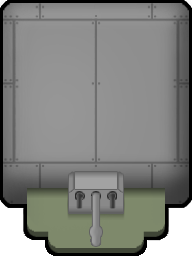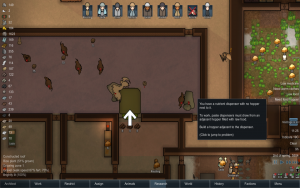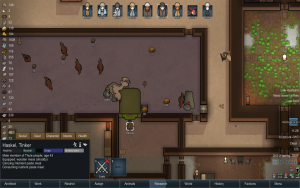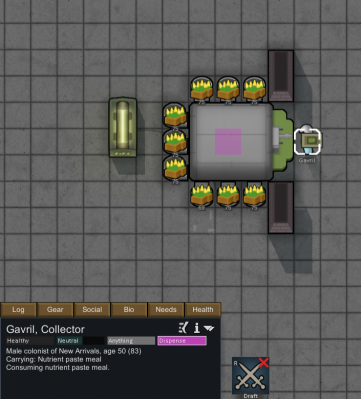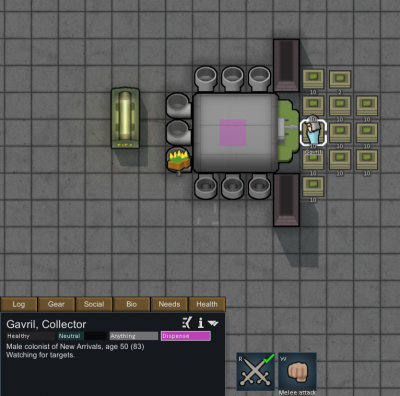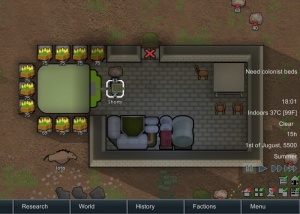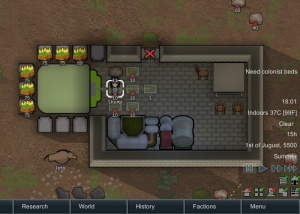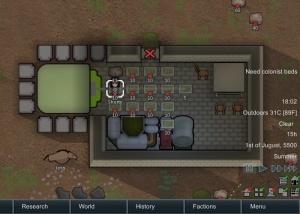Difference between revisions of "Nutrient paste dispenser"
| Line 74: | Line 74: | ||
''Notes'': | ''Notes'': | ||
* If you wait a little to long with pausing the game, after the pawn has produced a meal, they will move away from the dispenser and consume the meal (ignoring the zone restriction). This is not a problem: simply draft and undraft the pawn, they will drop the meal on the ground and you can resume again at step 3 above. | * If you wait a little to long with pausing the game, after the pawn has produced a meal, they will move away from the dispenser and consume the meal (ignoring the zone restriction). This is not a problem: simply draft and undraft the pawn, they will drop the meal on the ground and you can resume again at step 3 above. | ||
| − | * Pawns prefer to eat meals that are already made, and not use the paste dispenser in those situations. If you want to protect your bulk-produced meals from colonists, you have to forbid the stacks or exclude the colonists from the area they are stored in. Domesticated animals will not eat from forbidden stacks, so an exclusion zone has to be used to reserve the food for animals. | + | * Pawns may prefer to eat meals that are already made, and not use the paste dispenser in those situations, depending on several factors that are difficult to control. If you want to protect your bulk-produced meals from colonists, you have to forbid the stacks or exclude the colonists from the area they are stored in. Domesticated animals will not eat from forbidden stacks, so an exclusion zone has to be used to reserve the food for animals. |
* Many pawns want to eat after getting up in the morning. This makes it easier to watch for hungry pawns if you plan to mass produce some meals. | * Many pawns want to eat after getting up in the morning. This makes it easier to watch for hungry pawns if you plan to mass produce some meals. | ||
Revision as of 01:41, 17 October 2019
Nutrient paste dispenser
Synthesizes nutrient paste from organic feedstocks. It consumes less ingredients and time than any other meal production method - but nobody likes eating nutrient paste. Accepts raw food, but not rough plant matter like hay.
Base Stats
- Type
- Production – Food
- HP
- 350
Building
- Size
- 3
- Placeable
- Yes
- Power
- - 200 W
The nutrient paste dispenser is an electrical device that converts raw food placed in an adjacent hopper into nutrient paste meals; the machine accepts all food except hay. The meals are produced on demand, when a colonist or prisoner uses the machine. No work bills or tasks can be performed at the machine, and no skills are necessary to use it. Animals can not use the machine, but will eat the produced meals if they are fed to them by other means.
Usage
The paste dispenser will be used automatically if it is available, accessible and powered up. Pawns will always prefer a more tasty food, and only use the dispenser if no better option is available. Colonists will access the dispenser in order to produce food to be fed to prisoners or patients (if no better food is available).
It is possible to trick a pawn into producing an arbitrary amount of meals (see below).
At least one hopper needs to be attached to the dispenser, and the hopper needs to be filled with sufficient raw food to produce at least one meal. All food except hay is usable by the machine, but only raw food can actually be delivered to the hoppers directly. Hoppers act like storage zones, and are configured in the same way. Colonists will deliver food to the hopper as a hauling task, just like supplying storage zones with items.
Note 1: Unbutchered bodies will be consumed by the machine, and only a single meal will be produced. The body will disappear without trace. If you build hoppers, eg. inside a freezer room, on top of an existing corpse, the corpse will be fed through the hopper into the paste dispenser. Make sure to clear any space for a new hopper if you do not want this to happen.
Note 2: Related to the above, the machine will consume any type of food (except hay), including all biological corpses as well as kibble, if the food happens to lie on top of a hopper. It is possible to force food on top of a hopper by taking it to a pawn's inventory (form a temporary caravan), and then manually dropping it in front of the hopper (the hopper needs to be directly south of the pawn). This allows for reprocessing meals (removing any ingredient penalties), as well as producing meals out of kibble (which will not carry the usual kibble penalty). This can safely be considered an exploit of game mechanics, as it is probably not intended for the dispenser to even process these types of food at all.
The dispenser will process insect meat and human meat at the full nutritional value, but eating the produced meals will incur the same mood effects as if the ingredients were cooked (eg. Cooked cannibalism for a nutrient paste meal made from human meat).
The paste dispenser acts like a wall that will separate rooms. Usually one will put the rear end (where the hoppers are attached) inside a refrigerated zone, so the raw ingredients will not spoil. The length of the device even allows for refrigerated and non-refrigerated hoppers on the same machine.
If the front end of the machine is inside a prison cell, only prisoners will be allowed to use it, just like with food that is stored in the prison cell. This is indicated by the front of the machine turning from green too yellow, like beds do. If the front of the machine is yellow, it is reserved for prisoner use. If you want to feed nutrient paste to prisoners, but avoid building a dedicated paste dispenser for the prison room, you can use the manual production method described below, and then deliver the produced meals to the prisoners just like other food.
Strategy
The nutrient paste dispenser is helpful, but not necessary for survival, unless the colony is in an extremely unforgiving environment, such as an ice sheet.
It is by far the most efficient way to prepare raw food in the game, increasing the nutritional value of its raw inputs by 200%. The nutrient paste dispenser never causes food poisoning, and will always instantly produce food on demand, as long as raw ingredients are available.
Building a paste dispenser early on will speed up colony development substantially. This is because it not only makes a cook unnecessary, it also uses the raw food far more efficiently than cooking does. Therefore, far fewer work hours will be required to produce the raw food (from hunting animals or growing plants). Also, early colonies often struggle with food poisoning, especially if no competent cook is available. This, too, is completely avoided if a dispenser is used exclusively.
However, consuming a nutrient paste meal gives your colonist an “Ate awful meal” bad thought, reducing mood by -4 (this is still better than the -7 mood "Ate raw food" thought). Compared to preparing fine meals for your colonists at all times, you will incur a net -9 mood penalty if you only serve nutrient paste; this is a substantial drawback of the dispenser. Especially at higher difficulties it might not be practical to use only nutrient paste for an entire campaign (this depends on how well colonist mood is managed in other areas).
In any case, having a paste dispenser as a backup food source is highly recommended for most colonies. Ensuring sufficient food supplies gets more and more difficult in a growing colony, and the food supply chain is easily interrupted. A paste dispenser helps tremendously in these situations, as it can be stocked with slow spoiling food, and the only event that always disables it is the Solar Flare; it is therefore a very reliable food source.
The paste dispenser also makes it a lot easier to keep animals that need to be fed by the colonists (such as dogs and grazing animals off the growing season). Feeding animals with paste requires some occasional micro-management to create meal reserves, since animals can not trigger the dispenser themselves.
Be aware that converting human or insect meat to a nutrient paste meal does not mask its origins. Doing so results in all appropriate bad thoughts hitting at once.
Manually producing meals
Using the paste dispenser is an automatic task that can not be explicitely triggered. It is still possible to make a pawn produce as many meals as you want, until the machine runs out of raw food to process.
You need at least one pawn to be hungry enough to demand a meal. This will happen at least once per day, per pawn.
Forcing the pawn to create meals exploits the fact that a pawn stops their current action when they are drafted. We also need to keep the colonist away from any food, so they will be forced to keep producing new meals at the paste dispenser.
Method 1: using a special zone restriction (recommended)
The following method uses a 1-tile zone restriction that is placed in the middle of the dispenser. This is the easiest method for producing more than one stack of meals at a time. In detail:
- Create a new area that covers exactly 1 tile in the center of the main body of the nutrient paste dispenser (as shown in the screenshot). The exact location of this area matters, in order for the pawn to be able to path to the paste dispenser.
- When one of your colonists (it does not matter which one) becomes hungry, and is about to eat a meal, pause the game and restrict the pawn to the area created in step one. You might also have to draft and undraft the colonist so he will stop the current action. The pawn will now be unable to do anything except produce meals at the paste dispenser, due to the zone restriction he is now under. He will even be unable to grab meals that are right on top of him, including the ones he produces from the machine!
- Wait for the colonist to walk up to the paste dispenser and draw a meal from the machine. Pause the game again at this point.
- To start mass producing meals, simply draft and undraft the pawn as many times as desired. Each cycle will instantly procure another meal from the dispenser, using up some of the resources from the hoppers. The meal is not consumed by the colonist, because drafting him will make him drop the meal on the floor, where it will be out of reach (due to the zone restriction). You can hold down the draft hotkey to rapidly mass produce meals.
- When you are finished, simply undraft the pawn a final time and remove the zone restriction from him. Done.
The entire process will require no in-game time, since the game is paused all the way.
Notes:
- If you wait a little to long with pausing the game, after the pawn has produced a meal, they will move away from the dispenser and consume the meal (ignoring the zone restriction). This is not a problem: simply draft and undraft the pawn, they will drop the meal on the ground and you can resume again at step 3 above.
- Pawns may prefer to eat meals that are already made, and not use the paste dispenser in those situations, depending on several factors that are difficult to control. If you want to protect your bulk-produced meals from colonists, you have to forbid the stacks or exclude the colonists from the area they are stored in. Domesticated animals will not eat from forbidden stacks, so an exclusion zone has to be used to reserve the food for animals.
- Many pawns want to eat after getting up in the morning. This makes it easier to watch for hungry pawns if you plan to mass produce some meals.
The pawn is restricted to a 1-by-1 tile wide area which is placed in the middle of the nutrient paste dispenser. The precise location of the zone is important. The pawn will now produce meals indefinitely when drafted and undrafted in front of the dispenser (while there is material on top of the hoppers).
This is the state after all hoppers are depleted. The pawn is now surrounded by stacks of nutrient paste meals. He is still unable to eat any of them, due to the zone restriction (which can now be removed and the pawn undrafted). Note that none of the meal stacks are forbidden, because that is not necessary with this method.
Now you can have as many nutrient paste meals as your heart desires! Enough to take with you on cold journeys! Enough to make an emergency food stockpile! Enough to use as animal fodder!
Method 2: manually forbidding stacks (casual use)
If you do not want to deal with zone restrictions, you proceed as in method 1, but then you have to forbid any new meal stacks that are created, before continuing to cycle the drafting. This method is a little inconvenient if you want to produce more than a single stack of meals, or if you repeat the process regularly (eg. to produce animal food).
